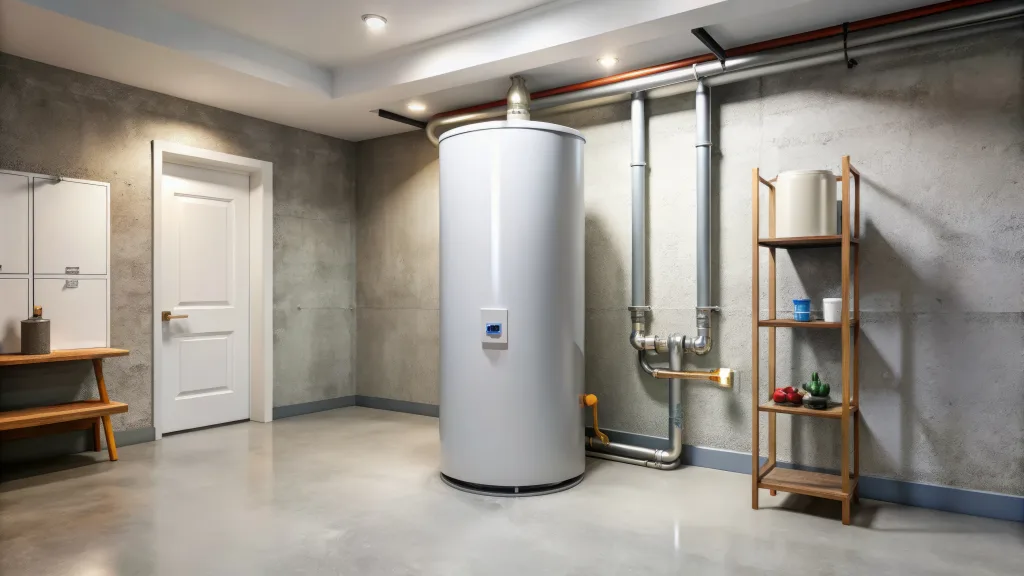Your hot water heater is vital to your home, ensuring comfort and convenience. However, when your water heater is failing, it can disrupt daily life and lead to costly repairs. If you’re a homeowner in the Twin Cities and Rochester areas, staying alert to the early warning signs of a failing water heater can save you time, money, and frustration. At Paul Bunyan Plumbing & Drains, we specialize in helping you identify these issues before they escalate.
This guide will explore the top 10 warning signs that your water heater is coming out. Learn how to recognize these red flags and take proactive steps to avoid expensive repairs or replacements while keeping your hot water flowing smoothly.
- Discolored or Gritty Water
One of the first signs that your water heater is failing is when discolored or gritty water starts flowing from your taps. This issue typically arises when the anode rod inside the tank wears out, allowing rust and sediment to build up. The tank can rust if left unaddressed, leading to costly repairs or a complete replacement. If you notice this, contact a plumber to inspect the anode rod.
- Foul Water Odor or Metallic Taste
Another red flag is failing is if the water smells bad or has a metallic taste. A common cause of a rotten egg odor is a reaction between the anode rod and bacteria in the water. Meanwhile, metallic tastes could indicate mineral deposits or corrosion in your pipes. If you live in the Twin Cities and notice these changes, it’s time to schedule a plumbing check-up.
- Leaking Water Heater Tank
A leaking tank is a clear sign your water heater is failing. Leaks often occur due to sediment buildup, poor maintenance, or the natural aging of the tank. If you find water pooling around the base of your unit, it’s crucial to have a plumber inspect it immediately. Leaks may require a complete tank replacement, which is more cost-effective than continuous repairs.
- Strange Noises During Operation
Hearing strange sounds like popping or cracking indicates your water heater is failing. These noises are usually caused by sediment buildup at the bottom of the tank. This sediment acts as a barrier between the heating element and the water, making your heater work harder. Regular maintenance, such as flushing the tank, can help avoid further damage.
- Reduced Hot Water Capacity
If your hot water runs out faster than usual, it’s a sign that your hot water heater is failing. Sediment can reduce the tank’s capacity, reducing available hot water. This problem is common in homes where water heaters are not flushed regularly. If you notice a decrease in hot water supply, it’s time to perform maintenance or consider a replacement.
- Lukewarm or Inconsistent Water Temperatures
Another common sign of a failing water heater is inconsistent water temperatures. This can occur due to a faulty thermostat or issues with the dip tube, which directs cold water to the bottom of the tank. If lukewarm water becomes the norm, it’s time to check your thermostat or call in a professional to assess your unit.
- Complete Loss of Hot Water
he most obvious symptom is a complete lack of hot water. This could be due to an electrical failure in electric heaters or pilot light or burner issues in gas heaters. In either case, immediate attention from a qualified plumber is required to restore your hot water supply.
- Fluctuating Water Pressure
Water pressure drops or erratic water flow can indicate that your hot water heater is failing. Sediment buildup or issues with the pressure relief valve can cause these fluctuations. If you live in the Twin Cities and notice unstable water pressure, it’s time to have your water heater inspected by Paul Bunyan.
- Rust and Corrosion on the Tank
Visible rust or corrosion on the outside of the tank is a major red flag that your hot water heater is failing. Over time, corrosion weakens the tank, leading to leaks and structural failure. If rust is present, replacement is often the best action to avoid a sudden breakdown.
- Age of the Hot Water Heater
Even if your unit seems to be functioning well, the age of the system can be a clue that your hot water heater is failing. Most water heaters last 8-12 years. If yours is nearing this age, it’s wise to start planning for a replacement before it unexpectedly fails, leaving you without hot water.
Conclusion: Don’t Let a Failing Hot Water Heater Catch You Off Guard
Your water heater plays a critical role in your home’s comfort, and the last thing you want is for it to fail unexpectedly. You can avoid costly emergency repairs or replacements by staying alert to the signs that your hot water heater is failing.
At Paul Bunyan Plumbing & Drains, we’ve been serving the Twin Cities area for years, helping homeowners maintain their plumbing systems. Our team of skilled plumbers can diagnose and fix any water heater issue, from sediment buildup to full tank replacements.
If you suspect your hot water heater is failing, don’t wait until it’s too late. Call us now at 612-340-1444 or schedule a service online. Don’t wait for a cold shower—stay ahead of potential problems with expert plumbing services from a team you can trust.


